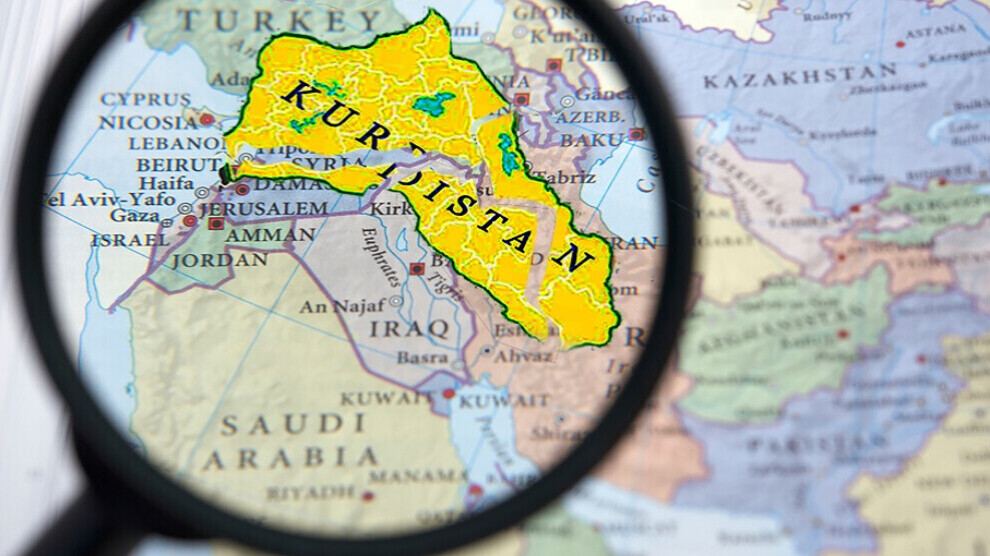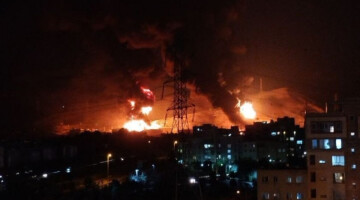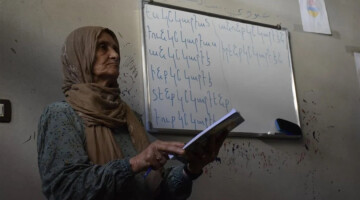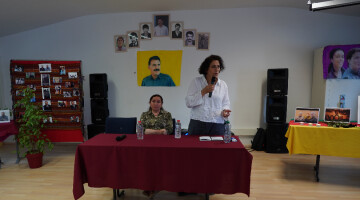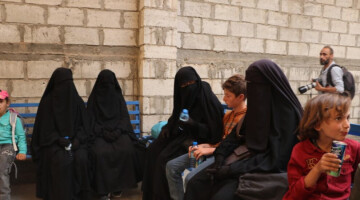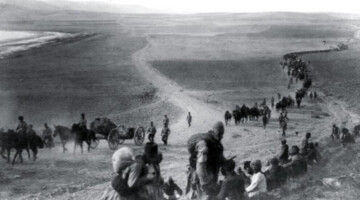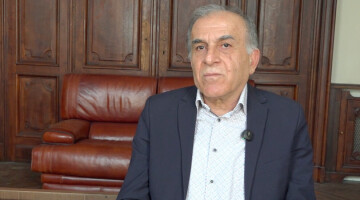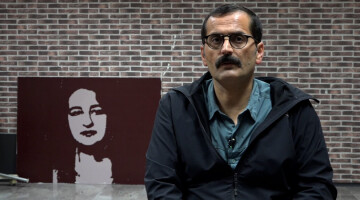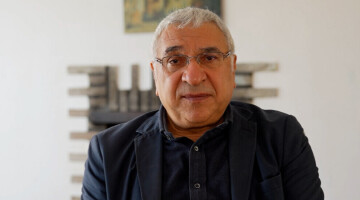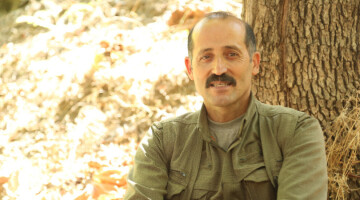The land described in the holy books as paradise and the Garden of Eden, where the four rivers, including the Euphrates and Tigris, flow, this land called Kurdistan was divided into four parts among the states of Turkey, Iran, Iraq and Syria under the leadership of Great Britain in Lausanne on July 24, 1923, where a policy of denial and annihilation was started. Thus, through the treaty that was set up in Lausanne, the Kurdish question became a universal problem, and Kurdish society found itself surrounded by genocidal politics. The reason why the Kurdish question does not fit into any of the classical, new and post-colonial definitions is, that the Treaty of Lausanne is a unique international genocide treaty. In this sense, the description of the Lausanne Treaty needs to be adjusted. Instead of describing it, as is often stated in world literature, that the Treaty of Lausanne was ‘the agreement of the Western states to divide and split up the Ottoman Empire’, and to correct it as the agreement of the Turkish State and Britain for the Kurdish Genocide and to split up Kurdistan.
Until the 19th century, when the Ottoman Empire tried to halt the process of its dissolution with the 1st and 2nd Constitutional Era, the Committee of Union and Progress, CUP and the regular army, the Kurdish people enjoyed an autonomous status. With the nation-state building of the Ottoman state, the policy of eliminating Kurdish autonomy came into effect and the 200-year-long history of Kurdish revolts began. Until the end of the First World War, the conflict with the Entente states was not based on protecting the Ottoman borders, but on finalizing the existing dissolution with a nation state. The current Turkish state's mind realized that the time of the classical empires was over and started to build a nation state. It was this attitude that led it to cede Egypt to France in a compromise, to withdraw from the Balkans and Arab countries, and mainly to try to preserve its sovereignty in Kurdistan and Armenia. In reality, the contradiction is between the Pan-Islamistic Ottomanists, who favored the continuation of the Ottoman state, and the nationalist CUP, which wanted to establish a Turkish nation state on the basis of the ideology of Turkishness, in agreement with Britain and the US. Likewise, the main contradiction of the European states was not with the Ottoman state, but with the conflict between them over which of them would emerge from this dissolution as the hegemonic power. For these reasons, when the Ottoman Empire was officially dissolved in 1918 through the Treaty of Mudros, Turkish political forces and public opinion did not see the treaty as a surrender, but rather as ‘the fact that a state, even if it has shrunk in size, has survived such a calamity by maintaining a political existence and national unity must be considered the greatest political achievement.’ According to the agreement, except for Kurdistan, the Ottoman state would not claim any rights in the straits, the Mediterranean, the Balkans and the Arabian peninsula.
The great tragedy for the Kurdish people began in the 19th century when Britain, France and Russia competed to share Kurdistan. For the Unionists, this was an opportunity to gain new international alliances in order to create a Turkish nation state out of an Ottoman state that was in the process of spontaneous dissolution. For the Kurds, it meant the beginning of an era of physical and cultural genocide in which the western states would agree with the Turkish state in its denial and extermination. This dark age, as a result of the Turkish state’s diplomacy with the US and the British, instead of the dissolution of the Ottoman Empire and the division of Anatolia, the US President Willson’s ‘homogeneous Turkish State’ and Britain’s 1915 ‘report for the protection of imperial interests: Asiatic Turkey’ in 1915, the option of leaving the Ottoman Empire as a state in Anatolia came to the fore. In this process, Britain, France and Russia occupied Kurdistan and Kurds started to resist on the basis of independence or autonomy. The most famous resistances in this regard are the Sheikh Mahmoud Berzenci rebellion, the Simko uprisings and the popular resistance against the occupation of Northern Kurdistan, which were suppressed as a result of direct attacks by the British air force.
Although Mustafa Kemal had reached a compromise with the British and US governments on a new Turkish state, since the European states were not in agreement, he went to Kurdistan in order to gain the support of the Kurds. In August 1919, he convened the Congress of Erzirom [Turkish name Erzurum], consisting mostly of Kurdish delegates, and explained what he wanted to do on behalf of Turks and Kurds and asked for their support. With the support of these delegates, the Congress of Sêwas [Turkish name Sivas] was held on September 8, 1919. A month later, on October 22, 1919, there was the meeting in Amasya, where Mustafa Kemal emphasized that the struggle was the common destiny of the Kurdish and Turkish people and promised autonomy to the Kurds. The Sêwas and Erzirom congresses were the congresses where the Kurds agreed with Mustafa Kemal on the principle of a common homeland and a common republic. The national borders were formalized in the Declaration of Amasya as the common Kurdish-Turkish borders that would emerge in the event that the Kurds joined the Republic of Turkey on the condition that their autonomy and representation in the Republic of Turkey were ensured.
For this reason, despite the article ‘For the Kurdish Region; a local administration will be established in the Kurdish provinces east of the Euphrates; after 1 year, Kurds can apply to the League of Nations for independence if they wish’ in the Treaty of Sèvres in 1920 when Kurdistan was divided between Britain, France and the Turkish state, the Kurds did not favor the Treaty of Sèvres which envisaged the division of Kurdistan and acted on the basis of not fragmenting Kurdistan.
However, even if the name of the Kurds, whose autonomy-independent state status was included in the Sykes-Picot and Sevres agreements, they are not even mentioned anymore in the Lausanne Treaty. The disregard and denial of even the name of the Kurds and their assimilation began with the Treaty of Lausanne. The Kurdish people were outraged by the Treaty of Lausanne and reacted to it with major uprisings in every part of the country, using their right to self-determination. Of the 28 Kurdish uprisings, Sheikh Sait, Seyit Riza, Zilan, Agri, Sason, Simko, Mahabat, Sheikh Mahmut Berzenci and Ahmet Berzenci were the most prominent ones. These uprisings were violently suppressed as a result of joint Turkish-Iranian operations and Britain’s military and international political support for the Iraqi state. Hundreds of thousands of Kurds, 90,000 in Dêrsim [Turkish name Tunceli] alone, 70,000 in Zilan and 30,000 at Mt. Ararat, were massacred between 1923-40. Re-occupation campaigns were carried out in the context of a state of emergency, the so-called ‘independence courts’ had been formed, deportation operations, the Kurdish names of the provinces, cities and villages were banned, and assimilation policies were implemented on the basis of Turkification. Between 1940-45, the government of İsmet İnönü presented the assimilation project for the Turkification of the Kurds to the British government and the British government approved it. Thus, the Turkish state broke its agreement with the Kurds on the basis of an autonomous Kurdistan-Democratic Republic in Lausanne in exchange for a Turkish Nation State, shared the Kurdish territories with Britain and assumed the central role of the Kurdish Genocide Regime.
The powers that made the Treaty of Lausanne agreed on the genocide of the Kurds, and since they knew by the very nature of things that a people would be in a constant uprising against fragmentation and annihilation, they desired exactly such a situation and divided the Kurds into four parts. The British state, which built four nation states in the Middle East with the Kurdish problem in its bosom, would thus use the Kurdish problem to design these states as it wished. In this context, the Turkish state was welcomed into NATO in 1950. Most importantly, while maintaining their historical enmity, all four states were to act jointly against the Kurdish question. No matter what kind of struggle the Kurds would resort to, they would find such a regional and international alliance against them. The plan to use the current state of fragmentation and denial of the Kurds to sustain the world hegemony and the nation-state system in the Middle East was to force the Kurds to deny themselves and accept Turkification, Arabization and Persianization, either in the form of ‘extreme loneliness’ or ‘surrender to another reality’. For the world, they would spread threats as centers producing and spreading fascist states and radical religious regimes.
For this reason, the First World War has never ended for the Kurds. Kurdistan has been in a state of WWI for a hundred years because of the Treaty of Lausanne. For the world, this means that the third World War is centered in the Middle East. The genocidal Anfal operation [genocidal attacks by the Iraqi Ba’ath regime against Kurds between 1986-1989] and the Halabja massacre in Iraq, the burning of more then 4 thousand Kurdish villages in Turkey, the displacement of 3 million Kurds and the killing of nearly a hundred thousand Kurds are just a few examples of the Kurdish genocide carried out in the last 30 years. Nationalism and religionism have been used as the most effective ideological weapons against the Kurdish people. Against the revolution of Rojava [Western Kurdistan/Northern Syria], IS, the most horrific expression of radical religionism, was put into action by the Turkish state to be used directly against the Kurds. It should not be seen as a coincidence that IS first captured the Kurdish city of Mosul, kidnapped Ezidi [Yazidi] Kurdish women in Şengal [Sinjar] and declared war on the revolution of Rojava, and also that the Turkish state invaded the cities of Afrin, Serê Kaniyê, and Girê Spî together with the IS. This meant that the Turkish state would respond with extermination wherever the Kurds gained presence.
In accordance with the Treaty of Lausanne, the Turkish state gains the power to fight-exterminate the Kurds with an international concept with the NATO alliance, and today, with the “Neo-Ottomanism Moderate Islam project”, it is spreading to the borders of Misak-ı Millî [National Pact] to complete the Kurdish Genocide. It appears a lot like a modern version of the situation with Hitler. The European states, which turned a blind eye to the genocide of 6 million Jews because Hitler fought against Soviet Russia, today give all kinds of support to the Turkish state in its war of genocide against the Kurds, because it is in the interest of the Turkish state in the Middle East. For this reason, the Kurdish people’s struggle for existence under the leadership of the Kurdistan Worker’s Party, PKK, for the last 40 years has been defined as a ‘terrorist movement’ by the NATO states. The leader of the Kurdish People, Abdullah Öcalan, was handed over to the Turkish state with the support of the US, and all kinds of technical and intelligence support were provided to the Turkish state in the war against the Kurds. Turkey is now attacking the Kurdish Freedom Fighters with all kinds of violence, including chemical weapons, with the weapons and intelligence support of NATO. It is perhaps the greatest irony of history that the honorable resistance of a people subjected to unprecedented international terrorism and held in the grip of genocide is defined as a ‘terrorist movement’. Dividing a country and a people between four states, assimilating them and even destroying their name is the most brutal act of terrorism in history.
In this sense, the parties of the Treaty of Lausanne should morally and politically correct this historical mistake. It is very painful, a people facing genocide is looking for an interlocutor. A people is looking for those responsible for its genocide. Because the Kurdish question is the question of a people, with a population of up to 50 million, being subjected to a genocide approved by the world. The problem is that the Turkish state today wants to continue the Kurdish Genocide by completing it with the NATO alliance and receives NATO support in this regard. In this sense, Lausanne is a process that has never ended, a form of genocidal rule that is very much alive and constantly in practice.
Nietzsche, called up on humanity in the name of the prophet of the Zagros mountains, Zarathustra, ‘any phrase that truly communicates an inner state, that does not pretend to be contrived, is good. My instinct is infallible in this matter, and I assume that there are listening ears for this work, and people who have the power to hear the same passion.’ We have always addressed the world with the belief that there are people with ‘the power and the same passion’ to hear a people’s cry for existence and freedom, because truth is always good. And we think it is better for humanity to hear every word that proclaims the truth. The gates of hell that open before the world are always closed by the political will of those who think well, speak well and do well. We have seen this most recently in humanity’s resistance for Kobanê. The Kurdish people’s struggle to protect their existence and gain status against the evil fascist nation states of the age is good for the world.

